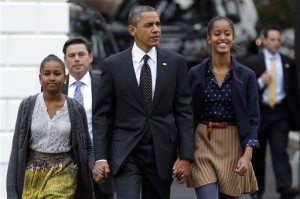Economy is still driving issue in US election
An AP News Analysis
WASHINGTON — The race for the White House is pretty much back where it started, after thousands of ads, billions of dollars in spending, two conventions and three presidential debates. Despite some detours, the emphasis is heavily on the nation’s lukewarm economy and President Barack Obama’s stewardship of it.
But if Tuesday’s election does amount to a referendum on the Obama economy, the outcome likely won’t shine a bright light on how to fix it. There’s too much polarization in the US capital and in the country as a whole — regardless of who wins — to produce a clear consensus plan for averting a looming “fiscal cliff” of higher taxes and deep automatic cuts in military and domestic spending.
Last week’s devastating East Coast storm, the campaign debates and controversy over the deadly terrorist attack on the US Consulate in Benghazi, Libya, scrambled things a bit in the home stretch.
But as millions of Americans vote for president, Congress and thousands of state and local posts, the excruciatingly slow economic recovery and continued high joblessness were clearly weighing on their minds.
Obama’s Republican challenger, Mitt Romney, doggedly tried to keep the focus on the economy. Its poor performance on Obama’s watch has been his main theme. He cites his own business background in presenting himself as the person who can heal it and restore jobs.
Article continues after this advertisementObama agrees that the economy remains challenged. But he points to a string of recent positive economic reports and a slow but steady drop in the unemployment rate as a reason not to switch leadership in midstream.
Article continues after this advertisementIf he wins a second term, Obama likely will be credited with keeping things from getting much worse and for policies like his auto-industry bailout that helped pave the way for an eventual comeback.
Both campaigns are mindful that no president since Franklin D. Roosevelt in the 1930s ran for re-election with a national jobless rate as high as it is now — 7.9 percent in October.
Romney has pointed out that the jobless rate is higher — by a tenth of a percentage point — than when Obama took office. Obama supporters note it’s an improvement from the 10 percent reached in October 2009.
Republican consultant Rich Galen said that while Obama’s handling of Superstorm Sandy did help the president some, any boost he got from that has subsided and the race “goes back to where it was a week ago” with the economy again the No. 1 issue.
Democratic pollster Doug Schoen, who worked for President Bill Clinton, said that “ultimately, it’s the economy” that will drive returns. “If Romney wins, it’s the economy. And if Obama wins, it’s because he’s been able to blunt the impact of the economy.”
Either way, Schoen predicts the country will be even more polarized after the election than it is now.
Ross Baker, a political science professor at Rutgers University, said the country remains closely divided, much as it was in the 2000 and 2004 presidential races.
“Both parties have consolidated their bases. There are really very few independents. They may not register their party affiliation. But they all lean in one direction or the other,” Baker said.
Economic issues will shape the national postelection agenda no matter who wins as the nation hurtles toward a toxic brew of expiring Bush-era tax cuts and more than $1 trillion in automatic defense and domestic spending cuts that will begin to take effect in January unless Congress can strike a deficit-reduction deal to stop it.
Congress, as closely divided as the nation itself, so far has been unable to do so. Economists and many in the business community warn that going over the so-called fiscal cliff could plunge the nation back into recession.
Congress returns to work next week to deal with the fast-approaching economic crisis and other unfinished business.
But House Speaker John Boehner, campaigning for Romney in Ohio, said he isn’t holding his breath waiting for a grand compromise and that a short-term temporary fix is probably “the best you can hope for.”
It seems doubtful the congressional mix after the election will be much more conducive to bipartisanship. Republicans are confident of keeping, even expanding, their majority in the House of Representatives, while Democrats are increasingly hopeful of retaining control in the Senate.
Even if the economy is central to Tuesday’s election, many economists say it’s likely to get better under either Obama or Romney.
Billionaire investor Warren Buffett, a strong Obama supporter, agrees.
The US economy is “inching ahead” and business will improve regardless, Buffett says, and “the economy will get better under either one of them.”
